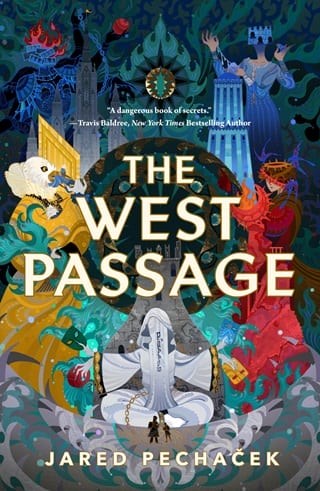An Interlude in Blue Tower
An Interlude in Blue Tower
Azure Vole 3 awakened before the light of dawn. There was no reason to, except habit. The Company of Illuminators had little work these days. He washed his face and hands and donned his indigo robe over his linen shirt. Though spotted with pigment and streaked with gesso, it was nicer than any his brethren had: he'd traded a painting to the Master of the Silk Rooms for it.
All the Voles slept on the floor of the scriptorium. The great room was a mass of shadows. Made for dozens, even a hundred illuminators, it now held only four, plus two apprentices, and the many empty desks and chairs were dark hazards to navigate in the blue hour before sunrise. To get to the dining hall for breakfast, he had to tiptoe over and around his three compatriots: Vermillion 1, Verdigris 2, and Ochre 5. (Ochre tended to sleep with his hands flung out, a different position every morning, very difficult to plan for and avoid.) There had been a fourth Vole, but he'd left one day and never returned (due to boredom, Ochre claimed), and the tower census takers hadn't gotten around to renumbering them.
It was early spring. Through the windows in the corridor came chilly air, laden with the scent of green. The vines all over the tower were in bloom, but until the sun rose, you wouldn't smell them at all. Against the ultramarine sky, Black Tower was drawn in charcoal. Its lamps were beginning to be lighted.
To see by, the dining hall had only candles and a great fireplace at one end, large and hot enough to roast a whole ox. There were seven long tables, and a dais with the high table for the Lady. Each office had its own assigned seat, intended to prevent scrambling at mealtimes, but now fully half the benches stood empty even on holidays, and at the high table, only three of the Masters had bothered to arrive for breakfast.
The Lady herself never came. She was old, even for one of her august sisterhood, and Vole had never seen her except as a shadowy form in a curtained palanquin, carried here and there through the great rooms of the tower. Her two daughters likewise never attended a meal, the tension between them always on the verge of erupting into a fight.
Azure took his seat. Servers moved along the tables, dishing out barley pottage. It was a little too thick today, and had too many leeks, but at least he was in time to get a chunk of bread; the kitchens usually ran out quickly, and felt no need to make more. This he ate with a very sharp cheese and a lot of small beer.
He lingered over his empty bowl. There was nothing much to do that day. He might go down to the library and look at some of the printed books, or wander up to the Archives and admire old manuscripts. Verdigris was at work on a little book of poems for a Master in Red, but the other Illuminators would probably just get drunk around midday—Vole himself included.
His own Master, who had passed the cognomen Azure to him, had bemoaned the sorry state of the Company, and drunk himself to death. That should have been a cautionary tale, but there were days when Azure saw the bottom of his cup and accepted that he and the others were likely to ignore the warning. There were so few people left, and with the palace trees dead or dying, what everyone needed from Blue Tower was not beautiful books but food.
Leaving the dining hall, he passed Verdigris and Vermilion coming in. Both of them smelled of ale already, which renewed Azure's thirst, and he went back upstairs to the scriptorium. In one corner, framed by two empty desks and backed by a high shelf of manuscripts, Ochre sat by a cask, dressed in only his shirt, finishing off the last of a row of three mugs. Upon seeing Azure, he filled one from the cask and passed it over, heady with yarrow and juniper.
"I'm getting rusty," said Azure after his second mug. "I just want to work again."
Ochre laughed, belched, and laughed. "Drink up."
"I don't want to drink; I want something to work on."
"We already break most of the rules anyway. Why not break the one on materials and make your own book?"
"I can't do that. I don't have anything to put in one."
They had this conversation often, and after the ale clouded their memories, they never fully recalled it. Ochre was content to sit around, take the occasional task that came his way, and otherwise drink and piss out the window, among other amusements. Though to a casual observer Azure might seem to be doing the same, in his chest was a wide-ranging restlessness: he needed some work, or he was not happy. And unlike Vermilion and Verdigris, he would not waste the scriptorium's supplies on doodles or little projects of his own. Azure was, more or less, a follower of rules, no matter how often Ochre urged him otherwise.
Ochre went to the window to relieve himself. He liked to brag that he was the reason the vines grew so profusely on the west side of the tower. The stock response from his brethren was But we're on the east side, to which he'd respond Exactly . This time Azure did not play his part. Some days, the ale made him dull and a little weepy, and even when Ochre repeated his joke a little louder, Azure ignored it. With a sigh, Ochre stumbled back to the little nook by the cask and dropped to his knees before Vole.
"Poor little boy," said Ochre with a pout. "Having a sad day again?"
There was a familiar eager brightness in his eyes. Down the sagging front of his shirt, Azure could see that the ale was stirring his blood. Some days, it did that to Ochre. That was usually a pleasant diversion, so Azure assented this time as well, allowed Ochre to tug up his robe, tumble a bit there in the corner by the cask, stain the indigo silk with a little more spilled ale. Ochre was simple flesh, which was a strange thing to lie with: soft here, hard there, smooth here, hairy there. Azure himself had a bird's head, which meant there were pleasures Ochre could give him that he couldn't give Ochre—and vice versa, if Ochre was in certain moods. He was not in one of those moods today, which was just as well; Azure had barely enough energy for the task at hand.
When they were done, Azure cast aside his robe entirely and collapsed backward on the floor in shirt and open hose, fanning his sweat away. Ochre, now entirely naked, lay next to him and attempted to drink more. He ended up slopping it on both of them. Azure was irritated a moment—how dare he be so careless—but that irritation was swallowed up in a wave of discontent so powerful that it spilled out of his eyes in large, hot tears. It had not been a pleasant diversion after all.
"Are you crying because you love me?" said Ochre lightly.
"Yes," said Azure.
"Good man," said Ochre, sitting up and reaching between Azure's legs to squeeze him gently. Filling another mug, he passed it to Azure, who sat up to drink and lay back down.
Dust drifted through the scriptorium, visible only in the light from the windows, but it was so thick in that light that you wondered how much you were breathing in. You could almost feel it settling on you. A thick coating of dust, turning you into another piece of disused furniture in a half-abandoned room.
Vermilion and Verdigris returned soon. Ochre slid the sleeve of his shirt over his crotch and kept drinking. Azure still lay on the floor, but as he had already been more or less dressed, he made no move to do anything at all.
"Can't you do that somewhere else?" said Verdigris, as he always did. Ochre made a rude gesture, as he always did. Anyway, Verdigris had been caught with Ochre himself once or twice, and with Vermilion several times. He was not one to talk, but had to protest for decency's sake.
"Order's come in," said Vermilion, entering just behind Verdigris and brandishing a piece of paper. "From Grey House, oddly enough. Guardian wants a copy of Goodlie Instruction for Tender Wits, or at least one page of it. Ochre, rhymes. That's you."
Ochre put out a hand for the paper, then stopped. "Give it to Azure this time."
"Are you sure?" said Vermilion. "It would give you something to do besides turning this room into a bawdy house."
"It takes two or more for that," said Ochre, "and if you're all busy…" He winked as he drank again.
Vermilion sighed and tossed the paper onto Azure's belly. "Get on it," he said. "She wants it as soon as possible."
Azure did not immediately obey. His eyes remained on the ceiling: flaking white plaster, dark beams, a cobweb every foot or so. Work . But only one page? What was the point of that? It would amuse him for a week at most.
Ochre's face floated into view. He was grinning. "Come on," he said. "You wanted something to do."
He spiked the paper on Azure's beak and went away. At last, with a groan, Azure got up, shrugged on his robe, and staggered to his desk. The ale was doing unkind things to his head and stomach. The paper, written in the heavy black lettering still used in Grey, asked for a page from Goodlie Instruction : the rhyme beginning There were six sisters to cross the river . Why would the guardian need that? Moreover, if she knew the first line, why not the rest of it? The rhyme was common enough.
Well, it was work, and it was the role of the Company of Illuminators to fulfill such requests. He sent an apprentice to the Archives for the book, and when it came, opened to the page requested. In the same black letters as the guardian's note, the rhyme ran:
There were six sisters to cross the river
One fell down in the cold, cold ground
There were five sisters to cross the river
One with thorns and iron was crown'd
There were four sisters to cross the river
One stood guard at the mouth of the sea
There were three sisters to cross the river
One ate gold and jewels with glee
There were two sisters to cross the river
One taught frogs their chorus to sing
There was one sister to cross the river
One caught death in a reedy ring
There were no sisters to cross the river
One springs up from the cold, cold ground
Who'll she catch when her time comes round?
He'd heard this once as a child. It was a counting, clapping sort of game that nobody played anymore, but older generations reminisced about the fun of chasing each other at the end. Like other such things, you'd find it referenced in texts but with many variations: a different order for the sisters, different acts that kept them from crossing the river. Most of them had only five, though. What possible use could a guardian have for this nonsense?
Urgent, said the request, so once an apprentice brought up parchment nicely tacked to a board, Azure got Ochre to start on the lettering. He was by far the fastest and most accurate, while Azure himself might labor for days and still not get it right. Meanwhile, Azure began grinding pigments. An apprentice fetched some distemper, and between the two of them, they blended the paint as Ochre wrote away.
The page in Goodlie Instruction was illuminated with five roundels and much fine tracery. Azure studied it carefully. Despite the skill, it was obviously a Lily reworking of a Thistle original. Too much white space—these periods of stylistic transition were always a little clumsy. A Thistle artist would never have left that awkward blank at the bottom right. In each of the roundels was one of the Five Sisters who founded the palace. Naturally: if anyone thought of the rhyme nowadays, they ascribed it to a folk tradition about the very beginning of everything. In versions of the rhyme with six sisters, the sixth was taken to mean the earth, which cycles between the rising fruitfulness of spring and the falling decay of autumn.
Ochre passed him the page, neatly and perfectly lettered. "I think she only really wants the rhyme itself," he said wryly to Azure. "You don't need to illuminate it."
Azure gave him a look, perhaps more severe than intended, and Ochre smiled an easy smile and went back to the cask. With pencil and ruler in hand, Azure laid out the horizontal lines for the little friezes, then the vertical where the roundels and traceries would swirl. Down the vertical, he marked off a point every two inches for a total of five, then took up a compass to draw the roundels, centered on each point. The page was still unbalanced, though. After a moment of thought, he added a sixth. Better that way—much more natural.
Then came the business of drawing, gilding, and painting. There was very little gold leaf at hand, but the page needed little, so that was all right. The apprentice had already made up some fresh garlic juice, with which Azure picked out tiny bits of foliage and the eyes of the Ladies. It was hardly dry before he applied the leaf: it did not look very good, but a rush job was a rush job. Time to paint. An even middle tone to start, then the darker shades, then fine lines of white lead to pick out the highlights. The Ladies took shape under his brush, exact copies of their sisters in the original; Azure was the best at imitating older styles. He left the sixth circle empty as long as possible, afraid of his own boldness.
Why had he done it? To Azure, the truest answer was probably that it looked better and he wanted more to do. There may have been another answer he was not aware of, but who could say, after all? It could not be avoided now that it was begun, anyway.
The other Ladies had each their model in the older page. But the sixth one, this sister in the ground, what would she look like? That question brought his brush up short. Last time he'd painted some thing original had been, oh, years ago. He'd been an apprentice still. Did he even remember how?
He had to remember, for there were no representations of the sixth sister in the Archives, she being at most a regional variant, but he could not leave the roundel blank or fill it with something off-theme. And he had to remember soon, for the guardian wanted this and he'd already delayed its completion. Black had her beetles and moon, Grey her stones and veil, Blue her tower and frogs, what would do for the sixth? Well, she was the earth after all.
Azure took up some verdigris and yellow ochre and thinned them down. He put an ochre face in the center of the roundel. He gave her a green dress, the sleeves dagged like oak leaves. For adornment, she wore vines. As they twined around her arms, a slip of the brush brought them outside the roundel. For a moment Azure was aghast: a mistake! But he rather liked the effect, so he joined the vines up with the tracery and added even more, so that all the decoration on the page stemmed from her. He touched it up with white highlights and set it to dry.
Ochre saw it and raised his eyebrows. "What have you done?"
"Something new," said Azure, and drained a cup of room-warm ale. The sun was rising now. Or setting. What day was it?
A courier came to collect the page and take it off to Grey. Unbeknownst to Azure, his first original work in years would be the last thing Hawthorn the Guardian saw before she died. He planned to make more, but soon word came that the Lady of Yellow had died, and at the news, her distant sister who ruled Blue expired of shock, and the two daughters both decided to take their mother's place.
 Fullepub
Fullepub 



